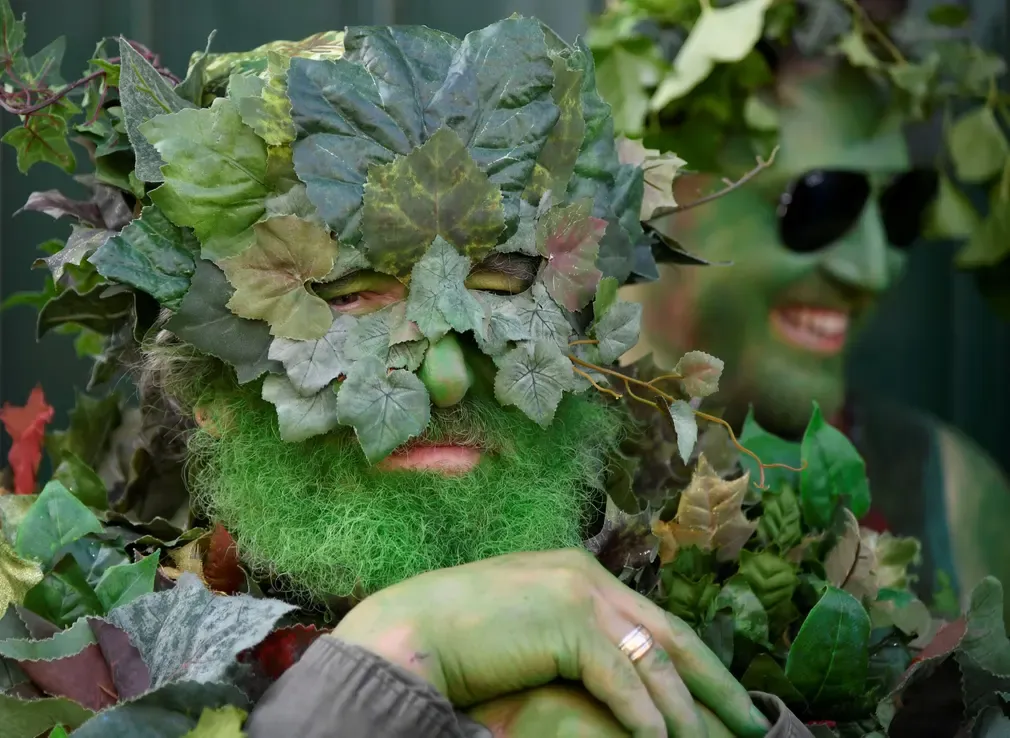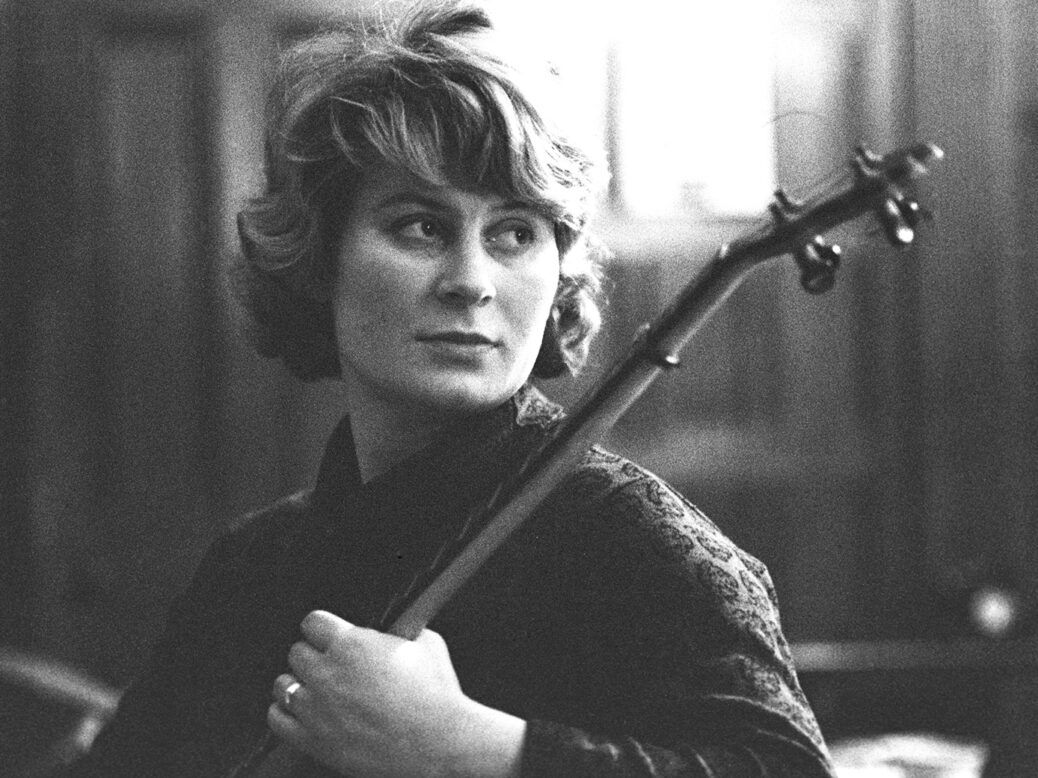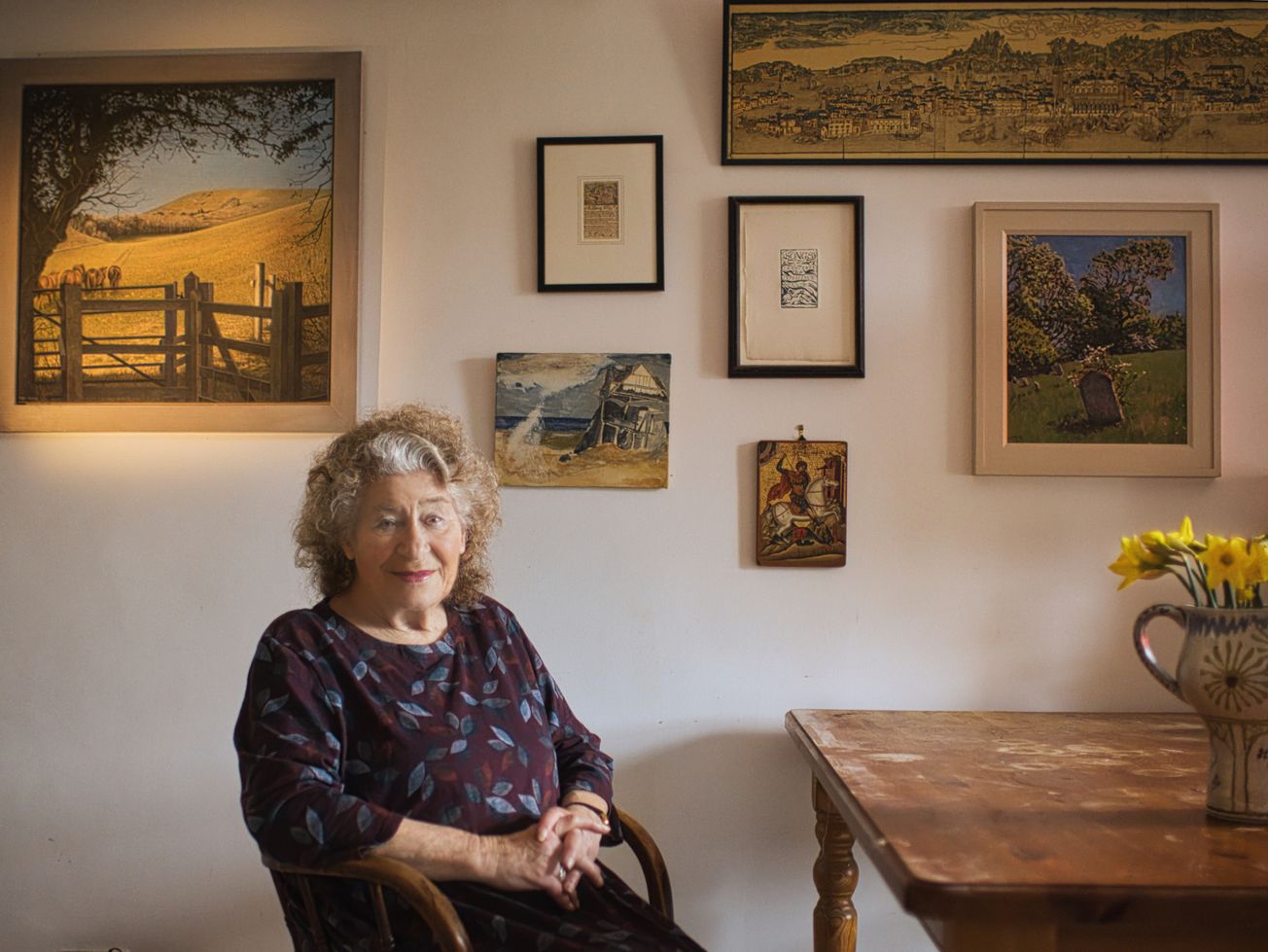by Sam Cox, Digital Music Editor
‘I was still in bed at nine o’clock in the morning and I suddenly heard some singing outside’ explains Shirley Collins over the phone from her house in Lewes, East Sussex.
The day in question was May 1st 2023, a few days before our conversation. May Day has long been a day of singing, dancing, and celebrating the end of England’s cold, grey winters, a tradition whose origins lay in the deep recesses of ancient, pre-Christian England. For folk singers, it represents an opportunity to remember this sprawling past through song. The voices she heard outside her door that morning were those of folk singer and song collector Sam Lee and his friends, who decided to pay a visit to Collins on their way to Hastings for Jack in the Green, an annual folk custom which itself is several centuries old. ‘They turned up on my doorstep at nine-in-the-morning and sang a May carol, which was absolutely lovely except I was still in my nightie.’

This abrupt human alarm clock perfectly epitomises the depth of feeling for Collins amongst – and beyond – the folk music community in England. This admiration can also be found permeating through the 2017 feature documentary The Ballad of Shirley Collins. The film, directed by Rob Curry and Tim Plester, follows the folk singer around her home in Lewes as she reminisces on her long career. Was it a strange experience for Collins to let cameras into her house? ‘No, because they were so lovely, and by the time the film was underway we’d all become such good friends. They were so lively and so funny and caring that it was a lovely experience. It didn’t feel strange at all, it didn’t feel like an encroachment or anything. It was just natural and nice.’ The film also tenderly portrays Collins’ friendship with stand-up comic Stewart Lee and David Tibet of avant-folk group Current 93, long-time fans whom she has since developed firm friendships with. The film makes clear that Collins is met with gratitude and affection wherever she goes, and from whomever she meets, such is the appreciation for the decades of service she has given her craft. Her long and disparate list of admirers, from Lee and Tibet to artists such as Angel Olson and Blur’s Graham Coxon, attests that her tireless dedication to carrying the torch of folk song has won her devotees beyond just the insular folk world.
Collins, now 87, began her recording career in 1959 and her influence has reached every corner of folk’s gently-changing landscape between then and now, owing to her diverse but ever-reverential recordings of traditional folk song. Her early albums are sparsely arranged but profoundly affecting, her Sussex-accented vocal soaring across songs whose histories stretch back far enough for Samuel Pepys to have written about them in his diaries. The albums she recorded with her sister Dolly are similarly anachronistic, and the latter’s melancholic arrangements make them more evocative still. Yet, her discography is not merely folk in its most austere guise. Her 1971 album No Roses with the Albion Country Band is punctuated by Richard Thompson’s sharp cries of electric guitar, and 1964’s Folk Roots, New Routes with Davy Graham gorgeously combines Collins’ ethereal voice with Graham’s cross-genre, cross-continental guitar style.
Nor can her influence be attributed simply to recordings of her own performances. Collins’ brief romantic and working relationship with American folk historian and archivist Alan Lomax saw her travel across the United States in 1959 and 1960, conducting field recordings of never-before-documented folk and blues music, which resulted not only in Lomax’s twelve-volume series of recordings Southern Journey, but in one of the songs from the trip later being sampled by Moby, and another being used in the soundtrack for the Coen brothers’ film O Brother, Where Art Thou? The series also marked the first recording of the later-legendary Mississippi Fred McDowell.
More than six decades on from her first full-length album Sweet England, Collins has once again been in front of the microphone recording her latest album for Domino Records, Archangel Hill. Her path from young songstress to folkloric elder stateswoman has not, however, been a straightforward one. In 1976, Collins and a band including her second husband Ashley Hutchings made a series of performances at the National Theatre and, as Collins dryly surmises, ‘The lure of the theatre and all that it held proved irresistible to Ashley.’ Hutchings left their family home to live with an actress from the production. Shortly after, Collins lost her voice. In the absence of any discernible physical problem, she concluded that her inability to sing was psychological. Collins didn’t record or perform again for nearly forty years, until she was coaxed back out of retirement by her doting new friends, including Tibet, for a critically-acclaimed album, Lodestar, in 2016.

In the intervening years, Collins had little other choice than to work a series of jobs, each one moving her further from the folk world she loved. This culminated in her final job at Brighton Jobcentre where she was, in her own words, ‘just getting through the day as best [she] could’, before retiring at 60. Besides a friend named Paul, with whom she is still close, she has lost contact with her other colleagues. One can’t help but wonder if these colleagues were aware that Shirley from work happened to be one of the most celebrated English folk singers of the past century. ‘I did occasionally talk about having recorded, but not at length or anything’, she remembers. ‘I don’t think they believed me, that I made albums. I mean, why would they?’ Her memories from this period aren’t necessarily fond but they do embody a working-class stoicism represented in so many of the folk songs she sings: ‘There are these times in your life where you have to accept it and do work whether you like it or not, because you need to be able to live and make some money.’
Today, Collins’ creative renaissance has happily been underway for a number of years. Archangel Hill is her third album in seven years and she has played a number of warmly received shows across the country with her band since returning to music. Is there a sense of making up for lost time that has inspired her to become so prolific? ‘Yes, and I haven’t got time to wait seven years before I make another [record]’, she laughs. ‘It’s just wonderful to have this encouragement from Domino to make a third album and it’s just so enjoyable. And there’s still so many songs I want to sing again, and record again, or just record for the first time.’ This unrelenting love for the source material, some of which she discovered for the first time on her recording trip with Lomax, is as tangible on her new records as it is on her earlier ones.
Where Collins’ voice once soared ethereally, since her re-emergence it has tempered with age, dropping an octave and becoming gentler. The authentic Sussex lilt is still there, though. If anything, the vocals on her recent albums do these traditional songs even greater justice, lending to them a quiet wisdom which all the better represents the way in which so many have been passed down across centuries, from older generations to younger. Nowhere is this vocal metamorphosis more stark than on ‘Hand and Heart’ from Archangel Hill, a live recording of a performance from 1980 nestled amongst these new recordings. ‘That was recorded in Sydney Opera House’, she tells me. ‘It sounds a bit like showing off doesn’t it? When we finally touched down at Sydney Airport, the Sydney Morris Men were there in the concourse dancing for us and it was such a lovely welcome.’ Another piece of evidence to support the claim that Collins can’t avoid veneration wherever she goes. Collins and fellow folk singer Peter Bellamy played a number of shows in Australia during their visit, but Sydney Opera House is the performance that really stuck with her. ‘I sort of take a deep breath now when I think about it. That was quite a responsibility.’
Performances in Australia and field recording trips in the States aside, a current that runs through Collins’ work is that of English folk song, and English identity. The title of her first album, Sweet England, attests to this creative impetus to explore the folkloric underbelly of Albion, and for her latest album her sense of place has become narrower still. Its title, Archangel Hill, refers to her stepfather’s nickname for Mount Caburn, a landmark near her home in Lewes, and the title-track sees Collins reading a poem written by her late father about their home county of Sussex. ‘He was a soldier in the Second World War and he wrote a book of poems which I’ve got. They’re not remarkable poems, they’re just verses, but this one was all about Sussex and it seemed to be the right thing to do to bring my dad in on an album. It really fitted so well. It was lovely to be able to do it and I’m glad I did. I feel good about that.’
England appears to many with an interest in folk culture as a country uniquely dismissive of its traditions. Where Ireland and Scotland still seem littered with folk musicians playing in the corners of clubs and bars, folk music in England is much lesser-seen, a far more niche pastime, even something to laugh at derisively. ‘It’s very, very sad, because there’s some absolutely wonderful music, some wonderful songs in this tradition. I mean, the Irish don’t laugh at it, they welcome it and embrace it. As do a great many of the Scots. It’s an important part of their own lives, you know? Whereas in England we just let stuff go. I don’t know, I don’t quite get it.’ I ask her where she thinks this differing outlook comes from. ‘I think it might be something to do with class, because folk songs were collected or still being sung by people who were working class, working as farm labourers on land in the south. Fortunately, one or two people realised that it was a wonderful field of music.’ To that end, she credits English composers and folk song collectors Ralph Vaughan Williams and George Butterworth, although she is rather modest in not including her own vast contribution to this continuing tradition. ‘I think it’s a youth thing as well. When I was young, I still wanted to sing these songs. I loved them so much and it was what I was used to hearing. I think nowadays [young people] haven’t got the patience to stop and listen to a song that actually says something.’ She pauses, then laughs. ‘That’s probably an old person’s point-of-view. But once you discover folk music, it’s a good thing. People then realise it can be fun, it can be moving, it can be beautiful, it can be anything you want it to be, really.’
I ask her if she trusts the next generation and the generation after that to carry the baton of folk music that she has so unflinchingly carried herself for the past several decades, or whether there’s a real danger of these histories being forgotten. ‘I don’t quite know. If enough people will do it, yes you can carry it on. But there’s so much pressure on young people nowadays with computers and smartphones and things. I just don’t quite know how you cut through. But I have to be optimistic because clearly the songs have come through from generations back, of generations of people who have really had hard times. But one or two people still remember the songs and they come through and other people will pick them up. And hopefully they won’t be blitzed out by commercial music.’
On the subject of being lost to history, one of the great successes of Collins’ twenty-first century renaissance is defiantly avoiding this fate herself. To study Collins’ career is to see her side-lined time and again by a folk community that is so often male-dominated. In his book The Land Where the Blues Began, Alan Lomax reduces Collins to a footnote in describing their Southern Journeys recording project. Collins, he writes, was merely ‘along for the trip’. Similarly, after losing her voice she was given a job at Cecil Sharp House, the English folk venue and archival library. The work turned out to be secretarial and pervaded by an unfriendly atmosphere, and she swiftly left. Her name is also left off the credits on the front-sleeve of the influential 1972 folk revival album Morris On, despite her vocals serving as the record's high-water mark.
Collins, however, is writing her own history, and the tables have turned firmly in her favour. Her memoir America Over the Water was released in 2002 and duly corrects the omission made by Lomax concerning her vast contributions to their recording trip, tenderly exploring her own recollections of the period. She followed it up with a second, career-spanning book, All in the Downs, in 2018. In 2003, Collins became president of the English Folk Dance and Song Society, in 2007 she was awarded an MBE for services to music, and in 2016 she was given an honorary title of Doctor of Music by Sussex University. Admirers of her work are ever-increasing, and audiences at her shows are ever-enthusiastic. Her performance this year at Brighton Festival stirringly ended in with a standing ovation and a Morris dancer kneeling before her in an act of deference more heart-warming than any recent coronation. Perhaps her crowning achievement this century, though, is the three acclaimed albums she has released. The latest, Archangel Hill, is a celebration of England, a celebration of Sussex, but most endearingly a celebration the long-enduring force that is Shirley Collins herself.
Featured image: Grant Gee
Shirley Collins' new album Archangel Hill is out on May 26th on Domino.








